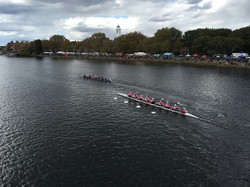The day, April 3 2022, was typical of an English spring. White, fluffy clouds, cumulus to be precise, sailed across a sky that had the steely blue of a cold spring day, as opposed to the deep, comforting blue of summer. They reminded me of a fleet of yachts come to share in the occasion, joining in the celebration of a great national event. But the wind had a chilly touch to it, not an icy one, but one that did not invite lingering outdoors without warm garments. But that did not deter the crowds, the many who thronged the key points on the route, come to rejoice in an elite sporting competition, and relishing the comforting return to traditional patterns of life. One team minibus had to struggle to reach the starting point as the crowds swamped the roads. It was good-hearted, no malice, no insults being traded, but it was the simple enjoyment of a one hundred and sixty six year tradition in which bright and athletic young people from Oxford and Cambridge, Britain's elite universities, meet for a race.
What created the atmosphere that day was in part a combination of joyous celebration of return to the normal niceties of life in a civilised country, combined with a contrast with evils happening elsewhere. That day we had already had news of atrocities against civilians in the Ukraine. We had also heard of a Scottish football match where a broken bottle was thrown onto the pitch. Savagery is never far away, but the boat race was a joyous and peaceful cultural occasion undertaken in a friendly spirit. Surely an antidote to evil news.
The race was favoured by a visit from Gloriana, the Royal Rowbarge, a wonderful piece of craftsmanship. You can access the Gloriana website at glorianaqrb.org.uk. It was a royal welcoming home for the race. It is worth an admiring look.
The race had been two years away from its home on the Thames. Twenty twenty saw the race cancelled, a massive disappointment to the young athletes who had given a year of intense physical training to the race. Twenty twenty one saw the race diverted to Cambridgeshire, with high handed authorities trying to minimise spectators, to no avail, as the spectators watched anyway. But twenty twenty two saw the race come home.
As usual, I took sides. I spent several years as an examiner for University of Cambridge Examinations Board, and have spent some of the limited free time I had in the city happily enjoying its architecture, particularly its churches, its market and its bookshops. My visits to Oxford have been limited to two day trips. So I always support the light blues of Cambridge over the dark blues of Oxford, and that is despite my having a nephew and niece who had successful spells at Oxford. So when early afternoon arrived I settled down to watch the race on television, hoping that Cambridge would continue with the run of success that it had been enjoying.






 Pilgrimage. A reviewon 06/15/2025
Pilgrimage. A reviewon 06/15/2025
 Leo the Fourteenthon 05/09/2025
Leo the Fourteenthon 05/09/2025
 The Melsonby Hoardon 03/25/2025
The Melsonby Hoardon 03/25/2025




Comments
really inclement weather would reasonably have the race postponed, but the weather in Britain is rarely extreme for long, so a postponement is not likely to be for long.
Thank you for your comment below, on Feb. 13, 2024, in answer to my previous, previous-day observation and question Feb. 12, 2024.
Postponing the race is the user-friendliest option for their enthusiasts.
Is there a from-month to-month span in which the boat race is held?
Postpone the race.
Unitedstatesian tennis champion Arthur Ashe considered in his two autobiographies how the English people display such an infectious enthusiasm for flowers, manners, rituals, teas and traditions.
What might the Oxford-Cambridge boat-race organizers do in the event of really, very inclement weather?
Would the race be held because of the English dedication to ritual and tradition or would it be rescheduled or would it not be held that year?
Only recent generations of royals have been to university, and only one, Prince Charles, went to Cambridge. None attended Oxford. Prince Charles did not get A level [matriculation] grades high enough for Oxford or Cambridge, but I recall that the left were planning to make his life at university hard, so he was sent to a college which could provide the most secure studying and living conditions. The left then started complaining about privilege.
Am I correctly or erroneously tending to associate Cambridge more than Oxford with royals who get university degrees?
If so, it's unexpected to me that the latter would be listed before the former. But then perhaps it's respect to elders because Oxford is a bit longer-existing than Cambridge.
It has always been Oxford-Cambridge and never vice versa.
Has and is the race always, always called the Oxford-Cambridge race? Is there such a thing as the Cambridge-Oxford race?
All rules may be altered, but I do not know of any boat race rules that have been. England likes to do things its own way.
Are boat race rules amenable to alteration or removal or are they in essence carved in stone? I wonder if it is possible that the Olympic take against cutting in someday will spread to affect the Oxford-Cambridge race.